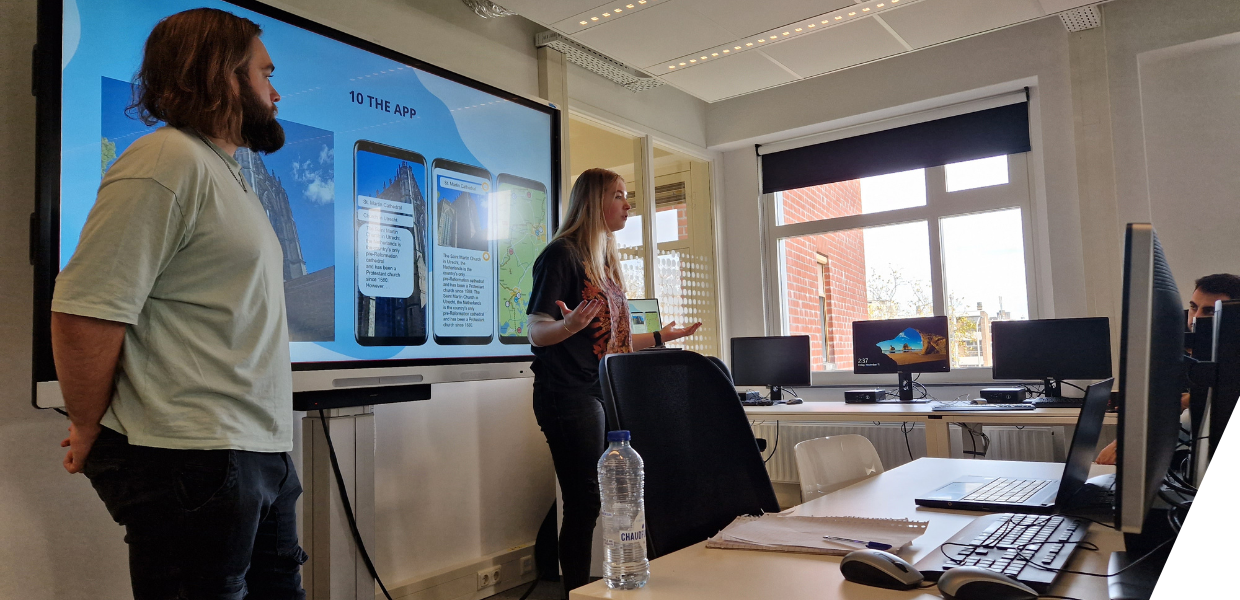Can you tell us about your project?
For the project, Tourism and AI students of Breda University of Applied Sciences worked together to curate geodata using the Europeana website and design a cultural heritage game for St Martin. Martin is a patron of many churches and convicts around the Netherlands and Europe, which are connected via the European Cultural Heritage Route and promote the values of sharing, mercy and equality. These values and religious sites are often forgotten among the young as other lifestyle products and interests become more important. So Breda University partnered with the Saint Martin Church in Utrecht to curate relevant information for a location-based game to attract a young target audience and share the European spirit.
How did you use Europeana's APIs and data from Europeana in your project? How was your experience of using them?
The Europeana API was used as a database to retrieve and add information about cultural heritage objects and sites in a user-centred way. Our project was based on the concept of crowdsourcing which means that users could co-create it, by, for example, adding information about cultural heritage, and curating and moderating (newly added) data (text, video, numbers, audio) which then trains artificial intelligence to create and moderate it - a technique called supervised machine learning.
During the hackathon we tested the API for feasibility. We experienced few problems in communicating with the database in itself, although some information we aimed to retrieve was unavailable/needed some more preprocessing, specifically with retrieving the actual images from the API, because we only got the indexing data back as opposed from the image.
Did you use any other technical tools that you had never used before?
Within this project we tried to make a connection to Niantic’s Lightship platform which is used to design location based games and playful experiences. The hackathon gave us a good overview of different technology components, their features and limitations. This has to be further explored and implemented in a clickable prototype.
We would love to hear from your students directly - what was the most valuable thing that they learned from the programme?
Jos Kamp, 4th year International Tourism Management Student, BUas, says, ‘During the Europeana Hackathon I have really seen the value of thinking outside of the box when it comes to combining different types of technology. The fact that Europeana adds so much value through their cultural heritage database provides many options for the future. Combining the strengths of different disciplines is an extremely powerful tool!’
Elisabeth Engering, 2nd year student Data Science & AI at BUas added: ‘The most valuable aspect I learned from this project was definitely the APi integration. The creative ways on how the information from such a big database can be used was fascinating!’
Where can people find your project, or learn from your work?
For now, you can contact the professorship of Digital Transformation in Cultural Tourism at Breda University of Applied Sciences - me, Professor Jessika Weber Sabil, via email (weber.j@buas.nl) or Frederike van Ouwerkerk (senior lecturer in Tourism, Ouwerkerk, Ouwerkerk.f@buas.nl) for more information or collaborations.
What's next for you/your team?
As the project is still in its concept phase, there are still many details for collaborations and further funding to explore. We intend to collaborate with another educational institute and the cultural heritage route of St Martin to develop a gaming prototype. Jos will evaluate and explore this prototype in his bachelor thesis. Also, the team is so much looking forward to going to Umbria in summer to continue the second phase of the hackathon and getting to know the other teams of the Europeana Low-Code festival.
Find out more
Explore and use Europeana’s APIs or discover more opportunities to use digital cultural heritage in education by signing up for the upgraded ‘Digital Education with Cultural Heritage’ 2023 MOOC.


